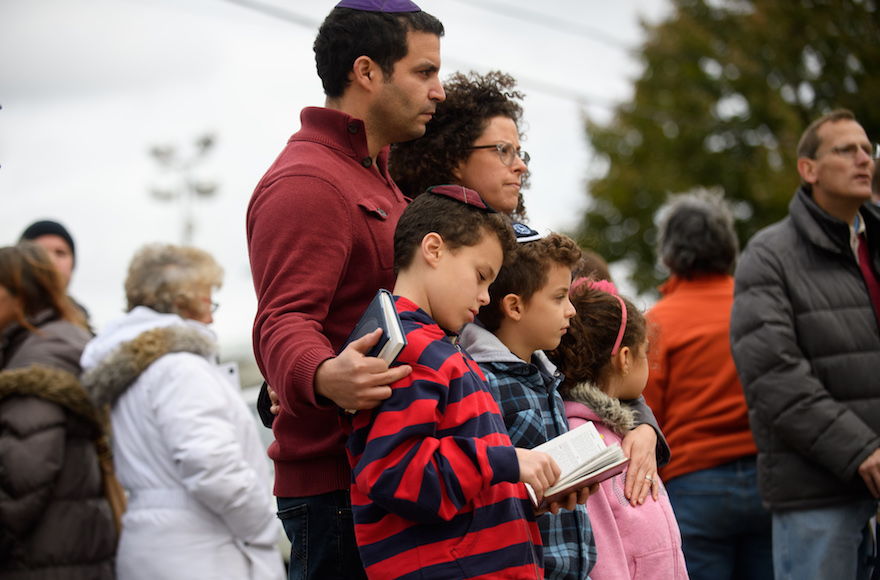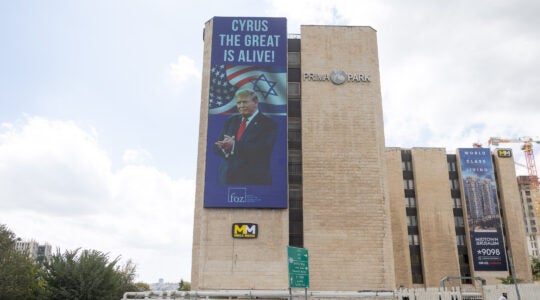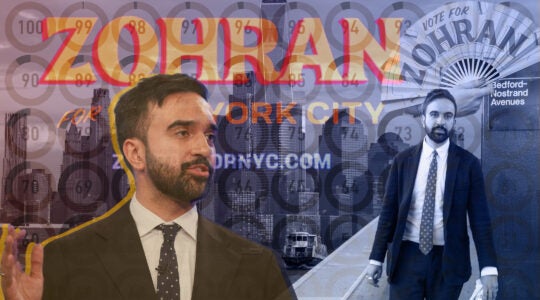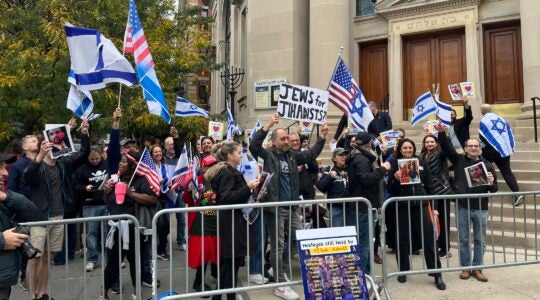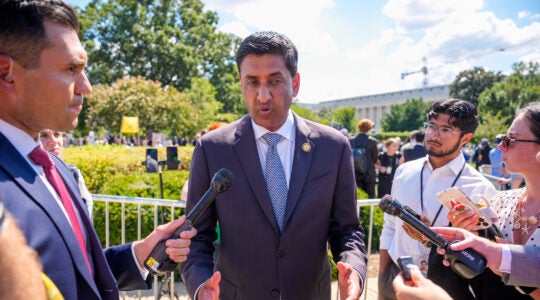PITTSBURGH (JTA) — In the wake of the worst mass killing of Jews in American history, there are Jews who want to grieve and Jews who want to grieve and assign blame.
It is that difference that has laid bare a festering difference among American Jews: How to treat President Donald Trump, who many blame for the fraught atmosphere preceding the violence, and especially how to treat Jewish Trump supporters, who believe this president is showing more support for Israel than perhaps any of his predecessors.
In this city, the rift already was apparent hours after a gunman pledging to kill all Jews rampaged through the Tree of Life synagogue complex, leaving 11 worshipers dead. An impromptu vigil organized by high school students at the intersection of Murray and Forbes avenues, the heart of the Squirrel Hill neighborhood where many of Pittsburgh’s 50,000 Jews live, ended with calls to “Vote! Vote! Vote!”
Twenty-four hours later, at the commemoration event at the Soldiers & Sailors Memorial on Sunday evening, thousands of Pittsburgh’s Jews reflexively applauded when Democrats were introduced, including Mayor Bill Perduto and Pennsylvania Sen. Bob Casey. Few applauded when Jewish officials of the Trump administration were introduced, including Jason Greenblatt, Trump’s top Middle East negotiator, and Avi Berkowitz, an adviser to the president.
Jeff Finkelstein, CEO of the Jewish Federation of Greater Pittsburgh and emcee of the event, apparently sensed the anger and asked the audience to withhold all applause. They did, for a moment, but soon were applauding Democrats again.
The divisions sharpened on Monday when Trump announced that he would visit Pittsburgh the next day, when the first funerals took place. Some Jewish groups were planning protests. The Pittsburgh branch of Bend the Arc, a liberal Jewish social action group, launched a petition calling on Trump to denounce white supremacists.
“President Trump, your words, your policies, and your party have emboldened a growing white nationalist movement,” the petition says. “The violence against Jews in Pittsburgh is the direct culmination of your influence.”
Rabbi Jeffrey Myers of the Tree of Life, who saved the lives of four congregants during the attacks, said that Trump was welcome to visit.
“I turn to all of our elected leaders because hate doesn’t know a political party,” he told CNN. “Hate is not blue. Hate is not red. Hate is not purple. Hate is in all.”
He added: “I turn to them to say, ‘Tone down the hate. Speak words of love. Speak words of decency and of respect. When that message comes loud and clear, Americans will hear that and we can begin to change the tenor of our country.”
Halie Soifer, the CEO of the Jewish Democratic Council of America, said criticism of Trump was appropriate even in the midst of grief.
“Mourning and placing blame do not have to be mutually exclusive,” she said in an interview. “It’s almost irrelevant whether [Trump] is an anti-Semite; anti-Semites see him as their champion and ally. He has emboldened those movements.”
Hours after the massacre Franklin Foer, a writer for The Atlantic who comes from a prominent Washington, D.C., Jewish family, posted a call for the effective excommunication of Jews who back Trump. He said the president’s broadsides against immigrants were echoed in the social media posts of the gunman, who believed Jews were behind the entry of undocumented immigrants.
“Any strategy for enhancing the security of American Jewry should involve shunning Trump’s Jewish enablers,” Foer wrote. “Their money should be refused, their presence in synagogues not welcome. They have placed their community in danger.”
He named, among others, Sheldon Adelson, the casino magnate, philanthropist and major donor to Republicans, including Trump, who has praised the president for moving the U.S. Embassy to Jerusalem and pulling the United States out of the Iran nuclear deal.
Julia Ioffe, Foer’s colleague who has written extensively about anti-Semitism in the United States and her native Russia, asked on Twitter whether Jewish Trump backers thought the embassy move “was worth” the massacre in Pittsburgh.
That infuriated Rabbi David Wolpe of Sinai Temple in Los Angeles, who admires both writers but penned an essay in the online magazine Tablet against such calls for excommunication.
Wolpe estimated that half his congregants backed Trump.
“My congregants are not the ones who are dangerous, and manipulating responsibility to turn Jews into perpetrators is ethically appalling — and communally toxic,” he wrote.
Wolpe, who has sharply criticized Trump, said in an interview that Trump’s incendiary rhetoric might certainly be counted as a causative factor. But so would the gunman’s possible psychosis, the political polarization that preceded Trump’s arrival on the political scene, the proliferation of guns and the persistence of bigotry.
“I fear it will be localized at one address, and there are a lot of different addresses here, and certainly one is the president, but it’s not the only one,” Wolpe said.
Matt Brooks, the CEO of the Republican Jewish Coalition, lashed out at liberal groups for, he said, using the killings to galvanize their troops a week ahead of critical midterm elections.
“Organizations and individuals are trying to score partisan political points and it is disgusting,” he said.
Brooks noted that the killer reviled Trump for being too close to Jews.
Trump also decried the anti-Semitism that fueled the killings, and in a letter, Brooks’ group praised him for it. (Trump also pressed ahead with campaign events, drawing criticism for insensitivity.)
J Street’s Jessica Rosenblum, a senior vice president for the liberal Middle East policy group, said the attack was inherently political and deserved a political response. The bigotries embraced by the killer “were countenanced at the top echelons of government.”
“Now is the time to make a solid plan within our movement and with our friends and allies to make a concerted effort to push back against this with all our might,” she said.
Stosh Cotler, Bend the Arc’s CEO, agreed.
“There’s no getting around the reality that this horrific situation is a product of our very toxic political environment,” she said.
Wolpe said that Trump’s critics were perhaps attaching too much meaning to the act of a deranged man.
“Unless you define politics as everything is a political act, I’m not sure the gunning down by a lone and obviously deranged political man is in itself a political act,” the rabbi said.
Ioffe, writing in The Washington Post on Sunday, said that placing the blame on the killer alone was a dodge.
“Trump certainly never told him, ‘Go kill some Jews on a rainy Shabbat morning,'” she wrote. “But this definition of culpability is too narrow, too legalistic — and ultimately too dishonest.” (On Monday, Ioffe apologized for saying on television that Trump has radicalized more followers than ISIS.)
Ioffe acknowledged that the Pittsburgh gunman, like the Florida man who allegedly sent pipe bombs to liberals and CNN, and the driver who killed a counterprotester at a neo-Nazi march in Charlottesville, Virginia, last year, “were not looking for Trump’s explicit blessing.”
“His role is just to set the tone,” she wrote. “Their role is to do the rest.”
JTA has documented Jewish history in real-time for over a century. Keep our journalism strong by joining us in supporting independent, award-winning reporting.
